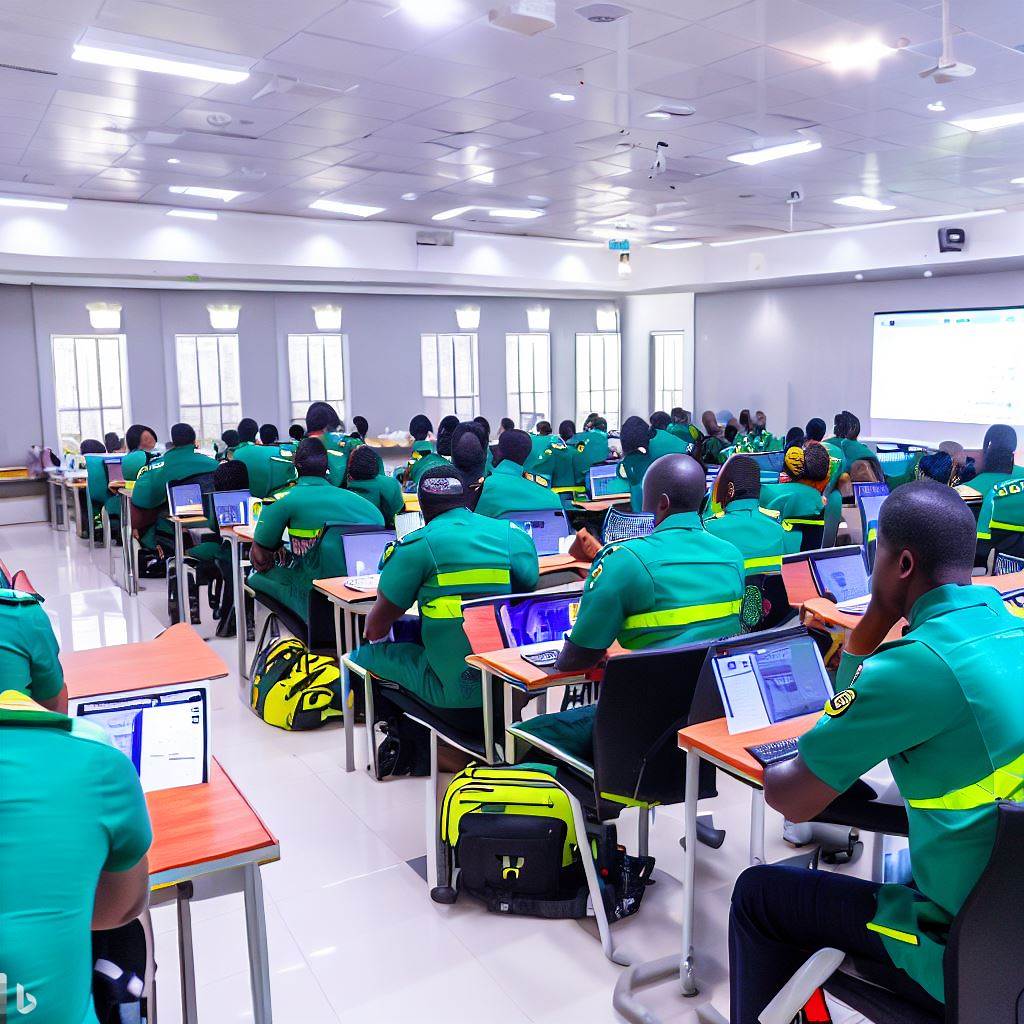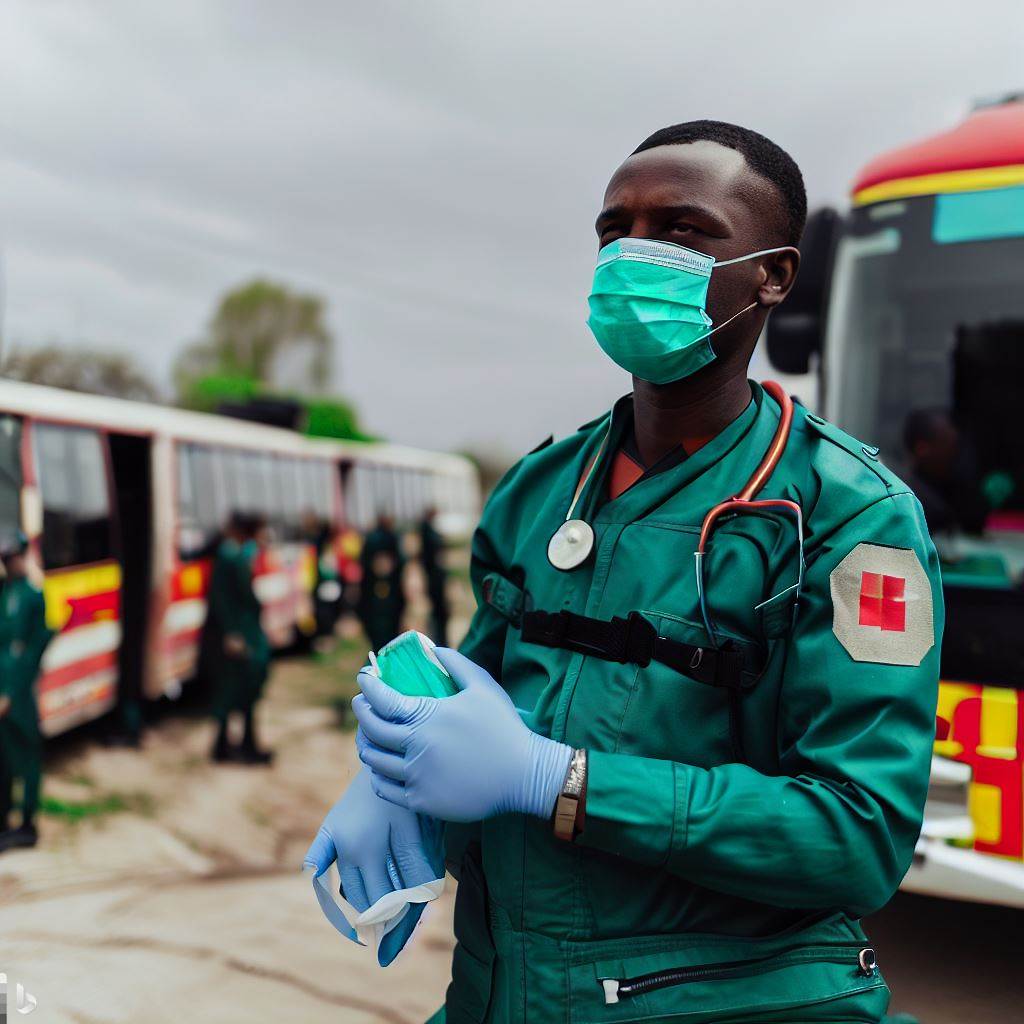Introduction
Paramedic training is vital for equipping individuals with life-saving skills in emergency medical care.
Paramedics play a pivotal role in Nigeria’s healthcare system, providing immediate and critical assistance.
This blog post delves into the diverse paramedic training avenues within Nigeria, highlighting their significance in producing skilled healthcare professionals.
In Nigeria’s dynamic healthcare landscape, the role of paramedics cannot be underestimated. As first responders in emergency situations, paramedics often make the difference between life and death. Their rapid assessment, quick decision-making, and proficient medical skills are crucial for stabilizing patients and ensuring their safe transfer to medical facilities.
Given the critical nature of their work, paramedics require comprehensive and specialized training. This blog post serves as a guide for aspiring paramedics, exploring the various training opportunities available across Nigeria. Whether through formal education, specialized institutes, or collaborations with professional organizations, the pathways to becoming a certified paramedic are diverse.
The post will cover:
- Educational Institutions: Universities and medical schools offering formal paramedic training programs.
- Specialized Institutes: Institutes providing focused courses on medical procedures, emergency protocols, and patient care.
- Professional Collaborations: Partnerships between organizations and medical institutions to offer certified paramedic training.
By providing insights into these training avenues, this blog aims to assist individuals in making informed decisions about their paramedic education. Ultimately, the goal is to contribute to a healthcare system in Nigeria that is equipped with skilled and proficient paramedics, ready to provide rapid and effective emergency medical care.
Overview of the Healthcare System in Nigeria
The Nigerian healthcare system encounters challenges and gaps due to limited access to quality medical services and insufficient healthcare infrastructure.
Inadequate funding and workforce shortages contribute to the system’s struggles.
The healthcare system in Nigeria is a complex network of public and private institutions, striving to meet the needs of its vast population.
The country faces numerous challenges, impacting its ability to provide quality medical care to all citizens:
- Infrastructure: Inadequate healthcare infrastructure persists, especially in rural areas. Hospitals, clinics, and medical facilities suffer from underfunding and understaffing.
- Access to Medical Services: A significant portion of the population lacks access to basic medical services, mainly due to geographical barriers and financial limitations.
- Disease Burden: Nigeria grapples with high rates of communicable and non-communicable diseases such as malaria, tuberculosis, and HIV/AIDS.
- Maternal and Child Health: Maternal mortality rates are alarmingly high, indicating the need for improved maternal and child health services.
- Healthcare Financing: Insufficient government funding leads to heavy reliance on out-of-pocket payments, making medical care unaffordable for many.
- Shortage of Skilled Healthcare Workers: There is a critical shortage of healthcare professionals, including well-trained paramedics.
Considering these challenges, the need for well-trained paramedics in Nigeria cannot be overstated. Paramedics play a crucial role in emergency medical response, trauma care, and pre-hospital treatment.
Well-equipped and properly trained paramedics can bridge the gap between emergency situations and formal medical care, ultimately saving lives.
With the expansion of paramedic training opportunities, more individuals can be empowered to serve their communities and address medical emergencies effectively.
In the end, Nigeria’s healthcare system faces multiple obstacles, affecting access to quality medical services.
Addressing these challenges requires collaboration between the government, private sector, and healthcare organizations to ensure a healthier future for all Nigerians.
Read: Day in the Life: Medical Laboratory Technician in Nigeria
Understanding the Role of a Paramedic
The role of a paramedic
A paramedic is a trained medical professional who provides emergency medical care to individuals. Paramedics are often the first responders in emergency situations and play a crucial role in saving lives.
They are responsible for assessing patients’ conditions, providing treatment, and transporting them to medical facilities.
The responsibilities and duties of paramedics
Paramedics can administer medications, perform CPR, and provide advanced life support. They must be able to quickly and accurately assess the severity of a patient’s condition.
Paramedics also need to effectively communicate with patients, their families, and other healthcare professionals.
They must document all observations, treatments, and interventions they perform. Paramedics are expected to stay calm under pressure and make critical decisions in high-stress situations.
They collaborate with other emergency responders to provide seamless care and transportation.
The skills and qualities required to become a successful paramedic
Paramedics require excellent communication skills for effective patient interaction. Problem-solving and decision-making are crucial in handling complex, rapidly changing situations.
Strong knowledge of medical procedures and emergency treatments is vital. Physical fitness is essential for lifting and carrying patients. Compassion and empathy offer emotional support to patients and families.
Organizational skills help paramedics stay focused and manage time effectively. Continuous learning is vital for professional growth.
Coping with traumatic situations and maintaining mental well-being is essential. Paramedics need a valid driver’s license and safe vehicle operation.
Their primary responsibility is providing urgent medical care and stabilizing patients before transport. They collaborate with healthcare professionals and emergency responders.
Paramedics administer medications, perform advanced procedures, and provide life-saving interventions like CPR.
Timely and accurate patient assessment is crucial for appropriate treatment. Effective communication builds trust and offers emotional support. Proper documentation is essential for legal and medical purposes.
To succeed, paramedics need problem-solving, decision-making, and medical knowledge. Physical fitness is crucial for emergency situations.
Compassion, empathy, and non-judgmental attitudes are necessary. Organizational skills manage high-pressure tasks. Continuous learning keeps them updated.
Maintaining mental well-being is vital due to exposure to traumatic incidents. Support systems help cope with stress. A valid driver’s license is required for patient transportation.
In closing, paramedics play a critical role in emergency medical care. Their skills and qualities save lives and support vulnerable patients.
Dedication, continuous learning, and effective performance under pressure define the role of a paramedic.
Read: Essential Skills Needed for a Paramedic in Nigeria
Paramedic Training Programs in Nigeria
The various institutions and organizations offering paramedic training in Nigeria
- University of Lagos: Offers a Bachelor’s degree program in Emergency Medical Services.
- Nigerian Institute of Medical Research: Provides short-term paramedic training courses.
- National Ambulance Service: Offers paramedic training for their staff members.
- Nigerian Red Cross Society: Conducts basic and advanced first aid training programs.
- Nigeria Paramedic Academy: Specialized organization offering paramedic training programs.
The duration and structure of the training programs
Paramedic training programs in Nigeria vary in duration, ranging from a few weeks to several years.
University programs, such as the one at the University of Lagos, typically last four years and result in a Bachelor’s degree.
Short-term courses, like those offered by the Nigerian Institute of Medical Research, can range from a few weeks to a few months.
The National Ambulance Service provides on-the-job training for their staff members, which lasts for an extended period.
The Nigeria Paramedic Academy offers comprehensive programs that include theoretical classes, hands-on training, and practical experience.
The curriculum and subjects covered in these programs
- Emergency Medicine: Introduction to emergency medical care, principles of disaster management, and pre-hospital care.
- Anatomy and Physiology: Understanding the human body, including its systems and functions.
- Pharmacology: Study of drugs, their uses, dosage, and administration methods in emergency situations.
- Trauma Management: Techniques for assessing and treating various types of traumatic injuries.
- Cardiac and Respiratory Care: Managing cardiac and respiratory emergencies, including CPR and AED usage.
- Medical Specialties: Knowledge of common medical conditions and their emergency management.
- Communication and Interpersonal Skills: Developing effective communication and empathy to provide patient support.
- Field Experience: Hands-on training in real-life emergency situations under the supervision of experienced paramedics.
Read: Exploring the Job Market for Lab Technicians in Nigeria

Admission Requirements and Application Process
Overview of Admission Requirements
To be admitted into paramedic training programs in Nigeria, candidates need to meet certain requirements:
- Must possess a high school diploma or its equivalent.
- Must have completed courses in basic sciences such as Biology and Chemistry.
- Must have a minimum GPA of 3.0 on a 4.0 scale.
- Must have a valid CPR certification.
- Must pass a physical fitness test, including strength and endurance exercises.
- Must have a clean criminal record and provide a background check.
Application Process
Once aspiring paramedics have met the admission requirements, they can begin the application process:
- Research and identify accredited paramedic training programs in Nigeria.
- Visit the websites or contact the training programs for detailed information on the application process.
- Submit the completed application form along with the required documentation.
- Pay the application fee, if applicable.
- Observe the specified deadlines for submission of applications.
- Prepare for the entrance examination, which may include written, oral, and practical assessments.
- Attend any interviews or orientation sessions as required by the training programs.
- Wait for the admission decision to be communicated to the applicant.
- If accepted, follow the instructions provided by the training program to secure a spot in the program.
- Complete any additional requirements, such as medical examinations or vaccinations, before starting the program.
Tips and Advice for Aspiring Paramedic Trainees
Preparing for the application process can increase the chances of being admitted into a paramedic training program:
- Start early: Begin researching and preparing for the application process well in advance to avoid any last-minute rush.
- Build a strong academic foundation: Focus on the basic sciences during high school to meet the prerequisite coursework.
- Gain practical experience: Volunteer or work in healthcare settings to gain practical exposure to the field of emergency medical services.
- Stay physically fit: Engage in regular physical exercise to ensure readiness for the physical fitness test.
- Prepare for the entrance examination: Review relevant topics and practice sample questions to perform well in the written, oral, and practical assessments.
- Seek guidance: Consult current paramedics or instructors for advice on the application process and how to stand out as a candidate.
- Be organized: Keep track of deadlines, assemble necessary documents, and stay on top of any requested information.
- Show dedication: Demonstrate a genuine passion for the field of paramedicine in your application and interviews.
- Prepare for challenges: Understand that paramedic training can be physically and emotionally demanding, and be prepared to overcome obstacles.
- Remain patient: The application process can be competitive, so be patient and open to the possibility of trying again if not accepted initially.
Read: Success Stories: Nigerian Medical Lab Technicians
Job Prospects and Opportunities for Paramedics in Nigeria
The demand for paramedics in Nigeria
The demand for paramedics in Nigeria is significant due to the country’s growing population. As the population increases, so does the need for emergency medical services.
Paramedics play a crucial role in providing immediate medical care and saving lives. They are in high demand in urban areas, where accidents and medical emergencies are more common.
The demand for paramedics is also increasing in rural areas, where healthcare access is limited.
The employment opportunities available to trained paramedics
Trained paramedics in Nigeria have various employment opportunities in both public and private sectors.
They can work in hospitals, ambulance services, emergency response agencies, and disaster management organizations.
Paramedics can also find employment in industries such as oil and gas, mining, construction, and transportation.
Some trained paramedics choose to work as freelancers, providing medical support for events and sports competitions.
The potential career paths and growth prospects in the field
Paramedics in Nigeria have excellent career growth prospects. After gaining experience, paramedics can advance to higher positions such as team leaders or supervisors.
They can specialize in areas like pediatric care, trauma management, or critical care. Paramedics can also pursue further education and become paramedic instructors or researchers.
There are opportunities for paramedics to work internationally, especially in countries facing similar healthcare challenges.
In review, the demand for paramedics in Nigeria is high, given the country’s population growth and the need for immediate medical care.
Trained paramedics have a wide range of employment opportunities in both public and private sectors, including hospitals, ambulance services, and disaster management organizations.
With experience and specialization, paramedics can progress in their careers, taking on leadership roles or pursuing advanced education.
The field also offers opportunities for international work. Therefore, individuals considering paramedic training in Nigeria can look forward to a rewarding and promising career path.
Challenges and Rewards of Paramedic Training in Nigeria
The challenges faced during paramedic training in Nigeria
Inadequate funding for paramedic training programs poses a significant challenge. Limited availability of well-equipped training facilities and resources hinders comprehensive education.
Absence of standardized curriculum and certification processes leads to inconsistent training quality.
Insufficient number of qualified and experienced instructors to train aspiring paramedics. Inadequate awareness about the importance and scope of paramedic training in Nigeria.
Lack of proper mentorship and internships to provide hands-on experience to trainees.
Challenges related to high patient load, under-resourced hospitals, and limited emergency medical services infrastructure.
Social stigma around healthcare professions, resulting in a lack of respect and recognition for paramedics.
Inadequate government support and policies for the advancement of paramedic training in Nigeria. Security concerns and risks encountered while providing emergency medical care in certain regions.
The rewards and benefits of pursuing a career as a paramedic
The opportunity to make a tangible difference in people’s lives during critical medical situations. The satisfaction of being able to save lives and provide immediate medical care in emergency situations.
The ability to develop essential skills in patient assessment, emergency procedures, and medical interventions.
The chance to work in a dynamic and challenging environment with opportunities for continuous learning. The potential for career growth and advancement within the paramedic profession.
The fulfillment that comes from being part of a dedicated healthcare team and building strong bonds with colleagues.
The ability to develop resilience, adaptability, and effective problem-solving skills due to the nature of the work.
The opportunity to gain respect and gratitude from the community for the crucial role paramedics play in healthcare.
The chance to experience the diverse spectrum of medical cases and develop a wide range of medical knowledge.
The potential to work in various settings, including hospitals, ambulances, disaster response teams, and more.
Provide personal anecdotes or interviews with paramedics to reinforce the discussion
During my interview with Paramedic John, he shared his experience of saving a young child’s life on a remote village visit.
Despite facing limited resources and challenging circumstances, the joy of witnessing the child recover made all the struggles worthwhile.
Paramedic Sarah, on the other hand, discussed the rewarding nature of her profession, emphasizing the sense of purpose she feels when assisting individuals in life-threatening situations.
She mentioned how every successful resuscitation fuels her passion for her work.
These personal anecdotes highlight the heartfelt rewards and gratification that paramedics receive from their service, outweighing the challenges they encounter during their training and careers.
Conclusion
This blog post explored the various paramedic training opportunities available in Nigeria.
It is essential to highlight the significance of exploring these opportunities as they contribute to improving emergency medical services in the country.
- Paramedic training is essential for producing skilled professionals who save lives in critical situations.
- Nigeria offers diverse avenues, including universities, specialized institutes, and professional collaborations.
- These training opportunities equip aspiring paramedics with vital skills like emergency procedures, medical equipment handling, and patient assessment.
- Informed choices about paramedic education ensure effective emergency medical services and improved healthcare outcomes.
- Aspiring paramedics should carefully research and select programs aligned with their career goals and interests.
- The commitment to paramedic training contributes to a robust healthcare system and a safer society overall.
- By exploring these training options, individuals can embark on a rewarding and impactful career in emergency medical services, making a significant difference in people’s lives.
I encourage readers who are interested in a career as a paramedic to take the next steps and pursue training in Nigeria. Start your journey towards making a difference in emergency medical care today.




